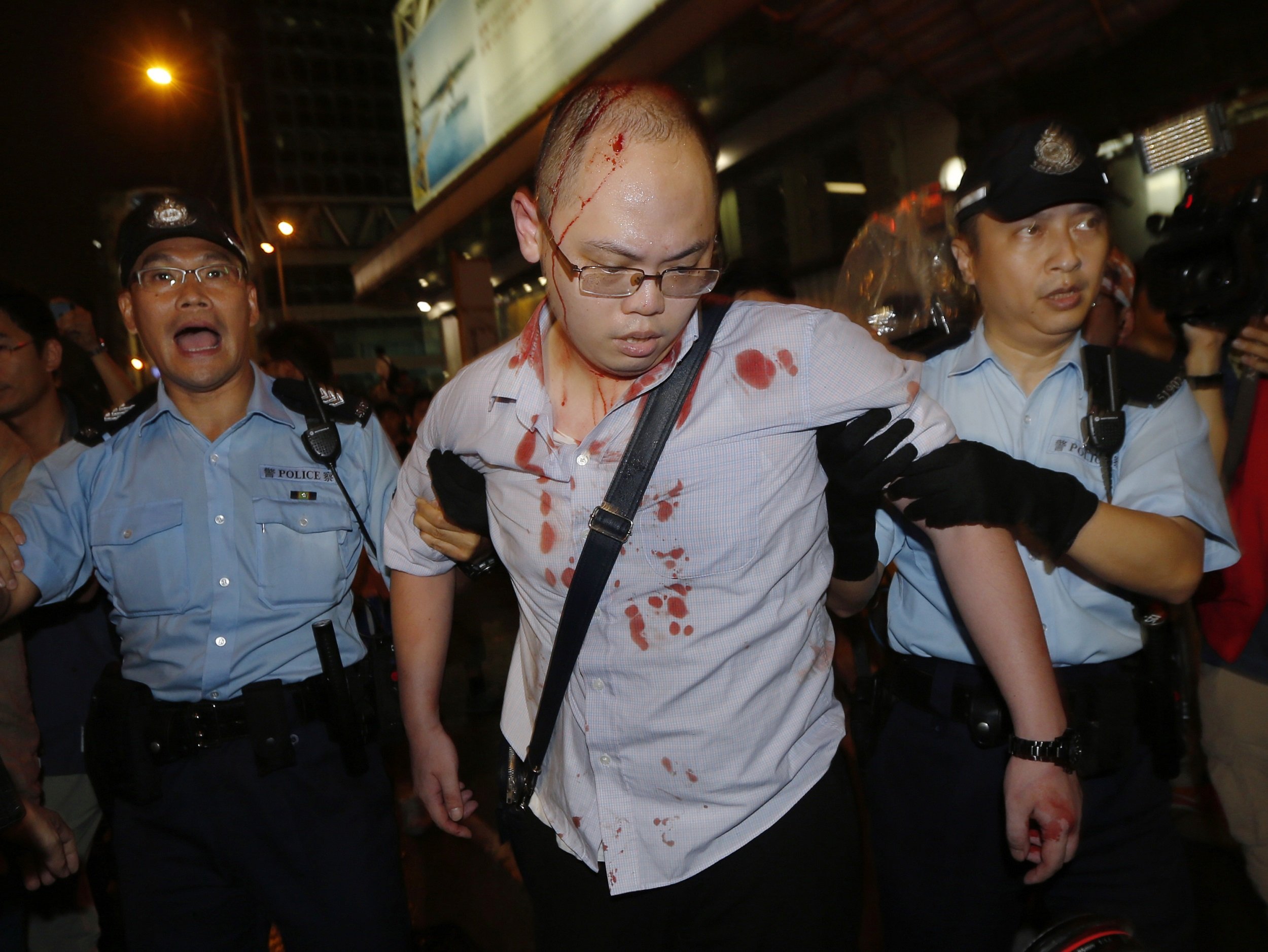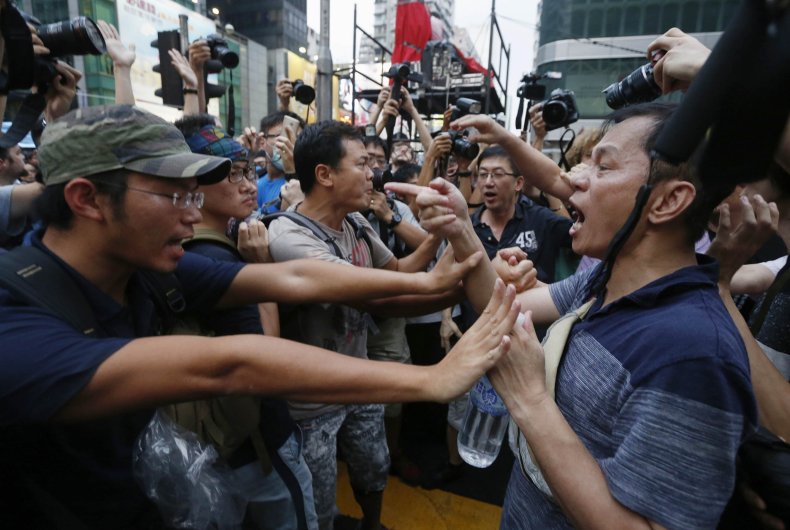
The possibility, however tenuous it may have been, that the democracy demonstrations in Hong Kong might deescalate—yesterday the government there said its chief secretary, Carrie Lam, would engage in talks with leaders of the demonstrations—now seems close to gone. Early Friday evening, anti–Umbrella Revolution gangs assaulted the pro-democracy crowd in the neighborhood of Mongkok and began fights with the demonstrators. It was the first time the student-led demonstrations had turned violent, and the Occupy crowd quickly dispersed and headed to the Admiralty area, where they hoped for better police protection. The immediate suspicion that the government, perhaps egged on by Beijing, had moved to instigate the "counter demonstrations" was widespread but could not be proven.
The images of violence were the last thing the student protesters wanted, and they again raised questions as to how far, in the end, the government and Beijing will go to end the tumult in the so called special administrative region. The possibility again loomed that a worse case, a Tiananmen Square ending could not be ruled out.
An elephant in the room for the Chinese government, should that disastrous outcome not be avoided, is what the economic fallout might be for the mainland. It is far from an incidental question. Beijing's political legitimacy rests largely on the country's economic success—the 30-year "miracle" of nonstop rapid growth, which has lifted huge numbers out of poverty and into the middle class. The basic equation has been clear: If the economy hums, few will complain (in contrast to the Hong Kong students) about one-party rule.
Should that basic tradeoff somehow be disrupted, the pressure on Communist Party rule would, most political analysts believe, intensify. That, of course, is the last thing China's President Xi Jinping wants.
The question arises, moreover, at a moment when China's economy is already decelerating rapidly. According to Wang Tao, chief China economist for UBS, growth has likely slowed in the third quarter to 7.1 percent year-over-year, the lowest reading since the first quarter of 2009, in the teeth of the financial crisis. The slowing growth has, according to press reports, started a struggle at Beijing's central bank, the People's Bank of China (PBOC) over the fate of its chief, Zhou Xiaochuan, a reformer who believes the country needs to be weaned off of its addiction to bank debt. (In order to achieve 7 percent growth for the year, some economists believe China's overall credit needs to expand by 35 percent year-over-year.)
The crackdown after Tiananmen in 1989 put China's economy in the deep freeze. Foreign direct investment dried up. Not until January 1992, when then paramount leader Deng Xiaoping famously visited Shenzhen, did the economy really begin to pick up again.
The difference between then and now, of course, is vast. China is today the world's second-largest economy, and it represents the planet's largest market for everything from automobiles to iron to gold jewelry. Every major company in the world has been operating on the assumption for nearly a decade that this would be its most important market going forward, pretty much forever.
That's why the potential for a spectacle of violence unfolding in one of the world's most visible, connected and global cities—gives foreign executives in China hives. "I don t even want to talk about it," moaned the China CEO for one large Midwest-based manufacturing company whom I've known for years. "Seriously, it's too depressing to even contemplate."
He may have to start. Economists at investment banks and hedge funds are starting to try to get a grip on what the economic fallout of the worst-case scenario might be. None, for obvious reasons, yet want to put their names to their thinking. Even though there are strict capital controls in place in China, the rich manage to find ways to get money abroad (usually, ironically enough, via Hong Kong). Capital flight will accelerate "well beyond what we see now, even though the government will try hard to limit it," says one mainland economist. That in turn will put downward pressure on the China's currency, the Renminbi, which has steadily risen in value against the U.S. dollar for the past five years. The cycle then becomes vicious, because only enhances the desire for companies and individuals to get money out of China.
Would foreign direct investment dry up, as it did post 1989, given how critical a market China now is? Depending on how bad the crackdown might be, "probably yes, at least for a while," said one multinational executive today. But he cautioned, "Never underestimate the trigger finger of CEOs who need growth and who know China isn't going away, pretty much no matter what happens."
Domestically, any further debate as to the wisdom of throwing more money at the banks, which in turn lend it out, would be over, at least for a while, just as it was after the financial crisis hit the West in 2008. Those in the PBOC, like Zhou Xiaochuan. Concerns about excessive leverage in the Chinese economy would go by the wayside, possibly setting the stage for an even harder landing down the road.
The news, plainly, would be all bad in this scenario; the only unknown is just how bad. The global economy is fragile enough as it is; if it's second-largest member takes a serious hit—and a self-inflicted one at that—the fall out in markets across the world would be significant. Thinking through such scenarios at a time like this isn't fun, obviously. But it may be necessary. It's up to the governments in Hong Kong and Beijing to make them an irrelevant exercise in disaster planning for businesses worldwide. Presumably this has to figure in the thinking of both as they grope for an endgame. Here's hoping.
Uncommon Knowledge
Newsweek is committed to challenging conventional wisdom and finding connections in the search for common ground.
Newsweek is committed to challenging conventional wisdom and finding connections in the search for common ground.
About the writer
To read how Newsweek uses AI as a newsroom tool, Click here.









